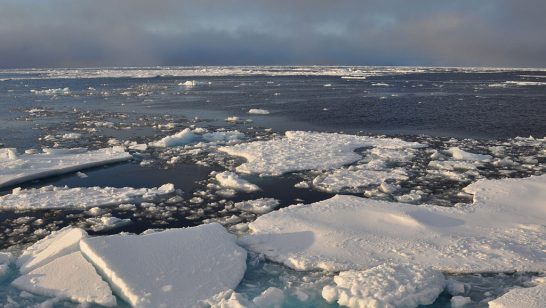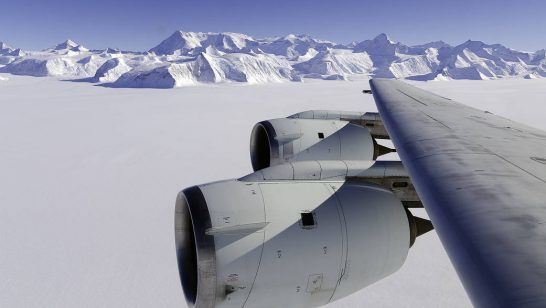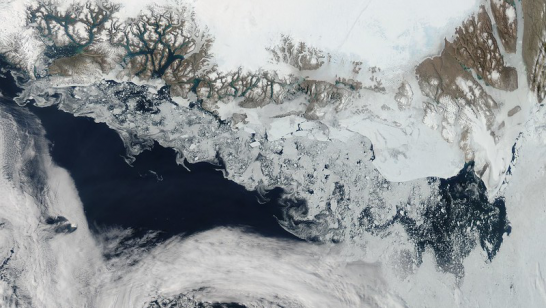
Russia’s invasion of Ukraine in February 2022 has had lasting impacts on every region of the world, even as far north as the Arctic. One month after the invasion, the seven other Arctic states apart from Russia – Canada, Denmark, Finland, Iceland, Norway, Sweden, and the United States – released a statement saying they would pause their activities in the Arctic Council. Russia was also suspended in other Arctic regional bodies, such as the Barents Euro-Arctic Council and the Northern Dimension. Traditionally non-aligned Sweden and Finland also began their NATO accession processes. When it became clear that the war in Ukraine would not end imminently, the remaining seven Arctic states allowed some resumption of work in the Council on projects (more than 70 out of 128) that did not involve Russia.
One month after the invasion, the seven other Arctic states apart from Russia released a statement saying they would pause their activities in the Arctic Council. Gabriella Gricius
Almost a year later, important questions remain about future Arctic regional cooperation. On May 11, 2023, Norway will take over the chairmanship of the Arctic Council from Russia. Diplomatic efforts are already underway to ensure the transfer of chairmanship goes as smoothly as possible. What will this Arctic Council look like? I outline three possible scenarios of what could happen: the best-case scenario, a middle outcome, and a worst-case outcome.
Best scenario: A Norway-led Arctic Council 2.0
The best-case scenario for the Arctic is a Norwegian-led effort to continue the Arctic Council in some capacity while recognising that Russia cannot hold the same position as before. Many researchers agree. Malgorzata Smieszek, from the University of Tromsø, stated, “They know how to do it” in reference to Norway’s pragmatic cooperation with Russia and Evan Bloom, a Senior Fellow at the Wilson Center, said, “Norway has balanced and protected the cooperation with Russia for many years while also pushing back against Russian aggression.”
Norway has a long pragmatic history of dealing with Russia as a neighbour in the region. It was able to work with the Soviet Union in the Arctic during the Cold War and with the Russian Federation afterwards by establishing the Norwegian-Soviet Joint Commission on the Environment in 1975 and resolving a 40-year-long maritime boundary dispute by agreeing to the Treaty Concerning Maritime Delimitation and Cooperation in the Barents Sea and the Arctic Ocean in 2010. More recently, Norway and Russia were both central to establishing the Barents Euro-Arctic Council and have consistently agreed to fishing quotas even in the wake of Norway’s recent Defence Analysis of 2023, which recognises Russia’s assertive Arctic policy, the role and significance of Russia’s Northern Fleet, and nuclear and hybrid threats emanating from Russia.
What this would mean for the Arctic Council would be some type of relationship built on the recognition that Russia makes up more than 50% of the Arctic Ocean coastline, and no Arctic regional body can exist without considering this regional reality. This does not mean sweeping the events of the last year under the rug. Rather, it would signify Russia taking a backseat in the Arctic Council but the remaining seven Arctic states allowing the minimum necessary cooperative work to continue at a lower level, primarily in the Working Groups, Task Forces, and Expert Groups, including individual scientists but excluding high-level political showmanship such as during Ministerial Meetings. This scenario will have tricky areas to navigate, such as the Arctic Council’s governance rule of consensus, where all states must agree.
What this would mean for the Arctic Council would be some type of relationship built on the recognition that Russia makes up more than 50% of the Arctic Ocean coastline, and no Arctic regional body can exist without considering this regional reality. Gabriella Gricius
There is some optimism that Norway recognises this need for nuance. In a speech given at the annual Arctic Frontiers conference, Norwegian Foreign Minister Anniken Huitfeldt acknowledged that “Norway is ready to take over as Chair of the Arctic Council in May… [and] we are doing what we can to ensure an orderly transition from Russian to Norwegian leadership” but that “normal political cooperation with the current Russian regime is not possible… under our chairship, the work of the Arctic Council will reflect this political reality. But we must ensure that the Arctic does not become the only region in the world with no effective multilateral cooperation.” In short, contact between Russia and the other Arctic states is still necessary, particularly regarding data sharing on environmental and scientific matters.
The middle ground: A toothless Arctic Council
A result that would fall somewhere in the middle would be the formal continuation of the Arctic Council, but at the same time, the simultaneous creation of a separate Arctic regional governance organisation that does not include Russia in any capacity. In short, the leftover Arctic Council from 1996 would be toothless and purely symbolic. Most likely, this step would be taken to maintain the organisation’s skeleton with the hope that it could be renewed when the war in Ukraine ends and Russia returns to compliance with international law. There is some merit to this scenario as it could preserve the organisation until it is ready to be revived. However, creating a separate organisation that only includes the remaining seven Arctic countries would remove much of the Arctic Council’s legitimacy and could lead to Russia leaving the Arctic Council altogether. Sweden and Finland’s accession to NATO could lead to this outcome regardless, as once both states are formal members, the Arctic Council would become a NATO + Russia organisation, which Russia might not find desirable. In reference to NATO’s turn to the Arctic, Russia’s delegate to the Arctic Council Nikolay Korchunov has already stated that “the internationalization of military activity by the alliance in the high north latitudes cannot but cause concern.”
It would mean that the region would lose out on Russian Arctic science cooperation. In the face of the continuing consequences of climate change, access to on-the-ground data is sorely needed. Gabriella Gricius
In addition, the simultaneous creation of an “Arctic 7” regional body would not only close the door to the tradition of cooperation the Arctic Council embodies, along with the long-term relationships within it, but it would also mean that the region would lose out on Russian Arctic science cooperation. In the absence of Russian scientists’ contribution, we rely heavily on satellites to map environmental changes in the Russian Arctic. In the face of the continuing consequences of climate change, access to on-the-ground data – including in Russia – is sorely needed. Instead of this transparent access to shared data, scientists would more than likely have to create and revive Cold War-era science diplomacy tactics, such as the International Geophysical Year (1957-1958), or find particular issue areas, such as polar bear conservation, and use international pressure to create diplomatic solutions such as the Polar Bear Treaty of 1973.
The worst case: No regional body
The worst-case scenario would be no Arctic Council at all, and in its place, Russia establishes a separate governance mechanism. This does not mean there would be no other legal mechanisms through which the Arctic states can work with one another. For example, historically Arctic states have abided by legal agreements signed, such as the Agreement on Cooperation on Aeronautical and Maritime Search and Rescue (2011), the Agreement on Cooperation on Marine Oil Pollution Preparedness and Response in the Arctic (2013), the Agreement on Enhancing International Arctic Scientific Cooperation (2017), and the Agreement to Prevent Unregulated High Seas Fisheries in the Central Arctic Ocean (2018). Other mechanisms like the Polar Code also exist to regulate shipping in the region. There is also a high likelihood that states would agree to respect each state’s sovereignty regarding the Exclusive Economic Zones (EEZs).
In the face of no Arctic Council, Russia could instead establish a different governance mechanism for the Arctic that would include its Asian partners while excluding the Arctic 7. Such a governing body would give legitimacy to states sorely lacking it in the region, such as China, and disempower not only the seven remaining Arctic states but also Indigenous Groups that have used the Arctic Council for many years as a platform to voice their concerns and opinions about regional issues and also to have a seat at the negotiating table.
Without the Arctic Council or any regional governance organisation that includes all Arctic states, there would be serious implications for states’ shared understanding of climate change, pollution, and transboundary issues in the Arctic. It would also foreclose the eventual need – post-war – to cooperate on shared regional issues and could leave the region a zone of competition. Further, the broad-scale consensus that the eight Arctic states should work together could be lost, and given the increasing geopolitical tensions globally, there is no guarantee that it would be found again. This would have consequences for both scientific cooperation in the face of climate change and the rights of Indigenous Peoples in the region, for whom the Arctic Council is a central mechanism where they – as Permanent Participants – have a voice on political issues across the region.
The broad-scale consensus that the eight Arctic states should work together could be lost. This would have consequences for both scientific cooperation in the face of climate change and the rights of Indigenous Peoples in the region Gabriella Gricius
Although it is undoubtedly true that real cooperation with Russia can only occur once the war ends, there is much reason to expect a resumption of minimum level of scientific data exchange with Russia when considering the future of the Arctic Council. Not only has Russia historically emphasised the importance of multilateral cooperation in the Arctic, but Norwegian politicians have also stated the same. While Russian President Vladimir Putin recently amended its new Arctic policy, ‘Basic Principles of Russian Federation State Policy in the Arctic to 2035’ to remove language around cooperation with other Arctic states, Russian Arctic behaviour and discourse around Arctic cooperation has largely been constructive and stable, offering some hope in the face of increasing Russia-West tensions. As Norwegian Prime Minister Jonas Gahr Støre said, “We should be able to find solutions with Russia… we must deal with Russia, now and in the future, as we have in the past.”
The opinions articulated above represent the views of the author and do not necessarily reflect the position of the European Leadership Network or all of its members. The ELN’s aim is to encourage debates that will help develop Europe’s capacity to address the pressing foreign, defence, and security policy challenges of our time.
Image: The flags of the eight Arctic Council Member States and six indigenous Permanent Participant organizations. Arctic Council Secretariat / Linnea Nordström



